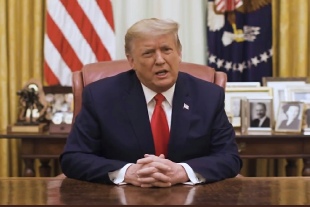
|
A week after Pedro Sánchez visited China, Spain's economy minister Carlos Cuerpo was dispatched to Washington D.C. to meet with his American counterpart Scott Bessent. The purpose of both visits was the same: to assure the Chinese and American governments, respectively, that the EU is a reliable trading partner. The EU's trade commissioner, Maros Sefcovic, also visited D.C. this week to convey
the same message. With all this frenzied diplomacy, Madrid and Brussels hope to prevent
a trade war from exploding when Donald Trump's 90- As is fitting for a country situated almost exactly halfway between the US and China, Spain is positioning itself as the European referee between two heavyweights. The danger, of course, is that it will receive a battering in the process. In fact that metaphor is not quite right, because the EU itself is a heavyweight: so there are three boxers in the ring, one of whom is also the referee and doesn't want to fight. Or so he says. Cuerpo emerged vaguely optimistic after his meeting with Bessent in the White House. The Spanish minister is "convinced" that Spain and the EU will be able to reach a trading agreement that is "balanced, fair and beneficial to both sides". But there are three parties to consider here, not just two. Sánchez said the same thing to Xi Jinping last week, which raises the problem of how Spain and the EU can resist taking sides with either of the two aggressors. |
|
|
Bessent warned last week that the EU would be "cutting [its] own throat" if it refused
to increase tariffs on Chinese goods, as it already has on electric cars. That could
be interpreted as a veiled threat of American retaliation, also with tariffs, against
a China- The trade tensions between China, the US and EU suggest that there are deeper factors
at work here - Spain is well- |


